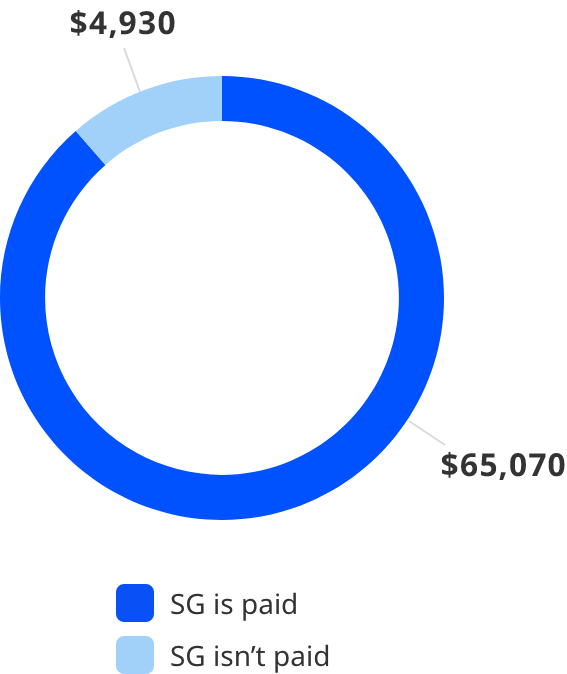What is the maximum super contribution base?
Updated on 1 July 2024
7 minute read
Your employer must pay you a minimum amount of super every year. But there's also a maximum limit. If you're a high-income earner, learn what it means for your savings.

Snapshot: maximum super contribution base
What: The limit for how much super employers must pay by law.
Who: If you earn over $65,070 in a quarter.
How the maximum super contribution base works
Let's start with the superannuation guarantee rate (SG rate). It's the least amount of super your employer legally has to pay you.
The current rate is 11.5% of what you earn for 2024–25.
The maximum super contribution base is the limit on what you earn each quarter before your employer can stop making SG contributions. The government sets this limit.
So, your employer doesn't have to pay you the SG rate on anything you earn above this quarterly super cap.
What is the maximum super contribution base for 2024–25
The maximum superannuation contribution base is $65,070 each quarter for the 2024–25 financial year.
The limit changes every year.
Example
The most your employer must currently add to your super is 11.5% of $65,070 each quarter.
Let's say you earn $70,000 every 3 months in 2024–25.
- The maximum super contribution base is lower than your salary.
- The rules mean that your employer pays the SG rate on only $65,070 of your salary every quarter. Even though you've earned more.
The maximum contribution base is a quarterly limit, not a yearly limit
Why's that important? It could affect you differently if your pay changes from quarter to quarter. Let's have a look at 2 examples.
-
Regular income
If you get a regular yearly income, you usually earn around the same amount every quarter. Your SG contributions will be the same, too.
-
Extra income
Say you're usually under the quarterly cap, but you get a one-off bonus. This could put you over the limit for that quarter. And it could mean you miss out on some employer super contributions.
What is a quarter?
Your employer has to pay you the SG rate at least 4 times a year (every quarter).
When it comes to your pay, a quarter is 3 months. It's counted from the start of the year.
| Quarter |
Dates |
| 1 |
1 July – 30 September |
| 2 |
1 October – 31 December |
| 3 |
1 January – 31 March |
| 4 |
1 April – 30 June |
Maximum super contribution base vs super contributions cap
There's a difference between the maximum super contribution base and the super contributions cap.
Maximum contribution base: It's a limit on how much your employer has to pay into your super.
Contributions cap: It's a limit on the total amount of money put into your super accounts.
What happens if you go over the maximum superannuation contribution base?
Once your salary reaches the quarterly super cap, your employer can stop paying you compulsory super on anything else you earn.
It's like a pause button for your SG contributions.
You can still make voluntary contributions or salary sacrifice, depending on your situation. Make sure you check your limits for both (super contributions cap).
It's also a good idea to ask your employer how much super they expect to pay you for the entire year. This will count towards your before-tax contributions cap.
Can your employer keep paying you super once you reach the base limit?
The employer super contribution cap doesn't stop your employer adding to your super. They can keep paying as much as they like, even though they don't have to.
And if they do keep paying super?
Then check your super contributions cap. Going over the limits could mean paying more tax.
Tip: It's easy to check your contributions online. Simply log in to your account or use the Australian Retirement Trust app for your transaction history.
Other ways to add to your super
If you reach the maximum super contributions base and your employer stops paying super, it means less going into your retirement savings.
But you can make sure your plans for life after work stay on track. Here are 3 ways to add to your super:
-
Salary sacrifice
Pay into your super from your before-tax salary and you could save on tax.
-
-
Getting personal financial advice can help you decide what's best for you. As a member with us, you get access to advice about your super and retirement planning.
Build your future wealth
Smart choices now mean a brighter future later. Take charge and add extra to your super.
Check your options







